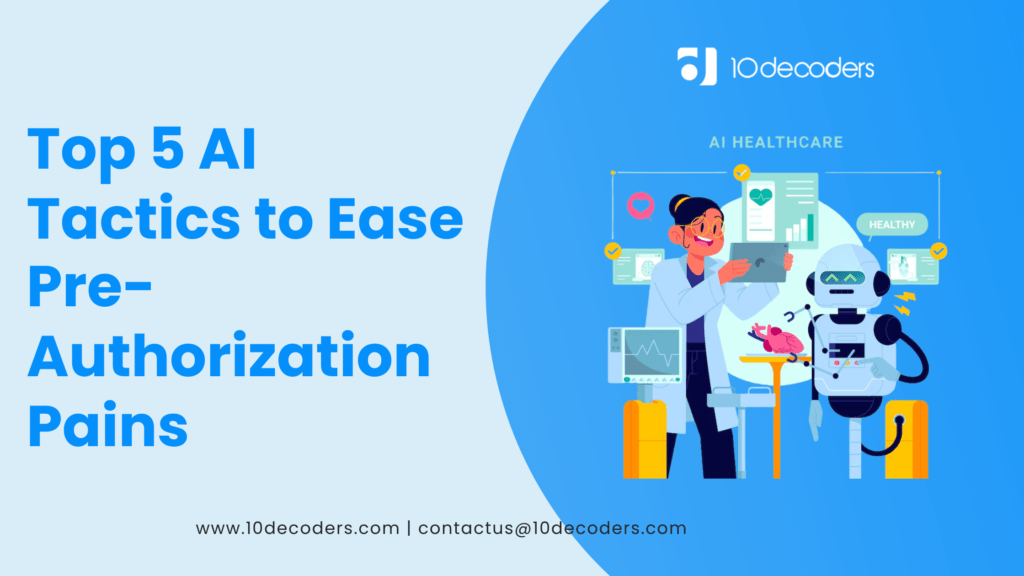Top 5 AI Tactics to Ease Pre-Authorization Pains
Introduction
Crack the code to healthcare revenue success with the power of prior authorization! While it ensures that clinical procedures are necessary and covered, it can also create significant hurdles, resulting in delayed care and frustration for both providers and patients. Many practices find themselves in a tug-of-war between delivering quality care and battling payer delays, leading to inefficiencies. But what if there were a way to streamline this process, enhance collaboration, and improve patient satisfaction? Then it’s time to embrace the AI pre-authorization process—a game-changer in transforming prior authorization workflows.
The Strain of Traditional Prior Authorization
Healthcare providers often find themselves overwhelmed by the complex and ever-evolving requirements for prior authorization. This administrative burden pulls clinical staff away from patient care and creates a disconnect in the patient journey. Discrepancies in payer documentation criteria can lead to frequent rejections, resulting in delayed care, increased operational costs, and dissatisfied patients.
A 2023 survey by the American Medical Association paints a grim picture: over 94% of physicians report delays in patient care due to prior authorization, and more than 25% of denials occur even after hours of administrative effort each week. These inefficiencies ripple through the system, leading to higher burnout rates among providers and adversely impacting patient outcomes.
AI Healthcare Solutions- A Smarter Approach to Prior Authorization
With artificial intelligence in healthcare integrated into the RCM, you can reverse the inefficiencies in prior authorization processes. AI automates repetitive tasks, reduces human error, and streamlines workflows, proving to be a powerful tool for enhancing both operational efficiency and patient care. Let’s learn how AI is transforming the prior authorization landscape.
Empowering Providers, Payers, & Patients via Healthcare AI Tools
AI in healthcare fosters better communication by creating a centralized platform for providers, payers, and patients to exchange vital information. AI enables real-time access to clinical documentation, ensuring that all stakeholders are aligned with payer requirements. The enhanced transparency not only accelerates the authorization process but also improves coordination, significantly reducing the chances of unnecessary denials.
Eliminating Errors with AI Pre-authorization Automation
How AI is transforming pre-authorization in healthcare? Manual processes are prone to delays and errors, but AI automates and simplifies the most tedious parts of the prior authorization workflow. Through integration with electronic health records (EHRs), AI can rapidly analyze large data sets, identify gaps in documentation, and match them against payer requirements. Real-time validation ensures that documentation is complete and compliant, resulting in quicker approvals and a reduced administrative burden on clinical staff
Spotting Patterns to Prevent Claim Denials
AI’s ability to anticipate claim denials based on historical data is one of its most powerful features. Machine learning algorithms can analyze past claims and spot patterns that indicate potential issues. Armed with this predictive insight, practices can take proactive steps to correct documentation before submission, mitigating the risk of denials and facilitating a smoother approval process.
Leveraging Data Insights for Proactive Strategies
AI-driven dashboards and business intelligence tools offer real-time tracking of key performance indicators (KPIs) related to prior authorization. Metrics like approval rates, denial rates, and rescheduling trends can be analyzed to pinpoint bottlenecks in the process. Such insights enable healthcare organizations to continually refine their strategies, ensuring alignment with payer expectations while optimizing revenue flow.
Ensuring Timely Care Through AI-Driven Approvals
AI technology for medical pre-authorization process significantly reduces delays, ensuring that patients receive timely care. Accelerating the approval process helps prevent unnecessary rescheduling or gaps in treatment, ultimately enhancing patient satisfaction. Furthermore, quicker approvals lead to faster reimbursements, improving the financial health of the practice.
Strengthening Healthcare's Future with AI-Driven RCM
The adoption of AI in revenue cycle management is now vital for healthcare providers aiming to address the inefficiencies of traditional prior authorization. Automating tasks, predicting risks, and optimizing workflows allow practices to concentrate on what truly matters—delivering high-quality patient care while ensuring financial stability. To fully harness the advantages of AI, having the right infrastructure and adequately trained staff is essential.
For organizations struggling with healthcare pre-authorization challenges, integrating AI with the guidance of an experienced RCM consultant can ensure a seamless transition to an AI-powered workflow. This approach not only enhances operational efficiency but also creates a brighter future for both patients and the practice’s bottom line. The future of prior authorization is here—powered by AI and ready to transform healthcare.



